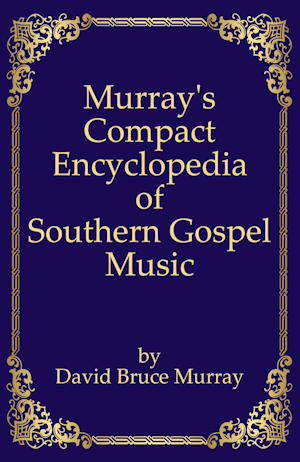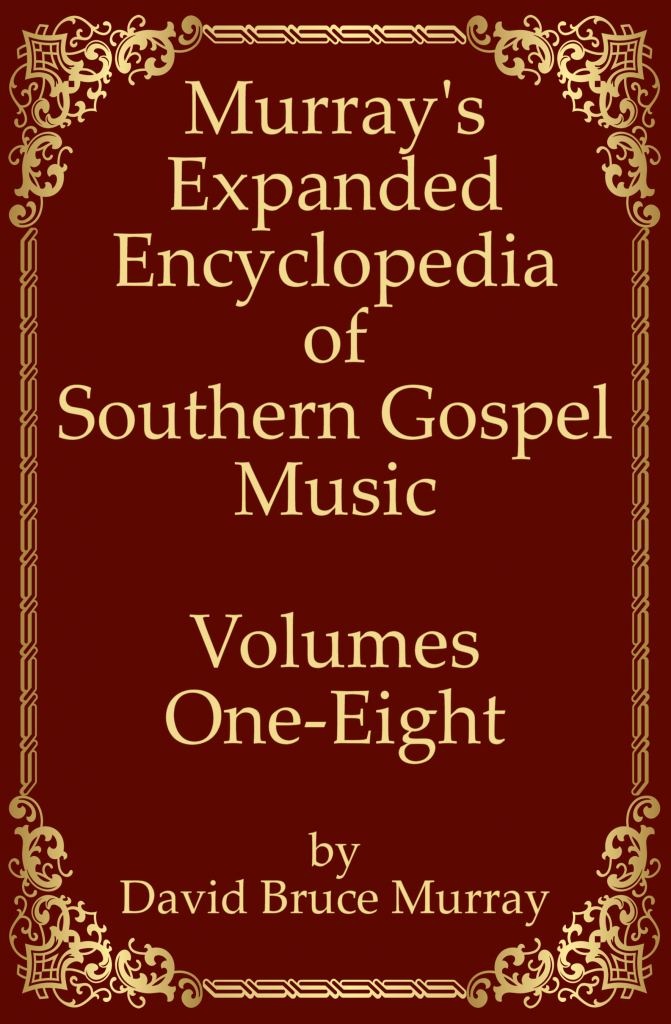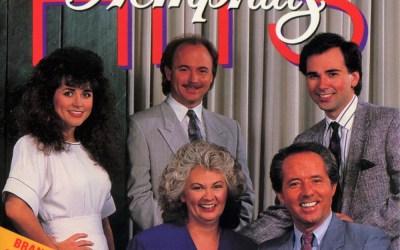“Gospel Ballads” was one of the first records I ever heard by the Rambos, and I was completely enamored with this album as a kid, and it’s one of my all-time favorite Rambo recordings. Filled with wonderful and lush orchestrations, it’s simply a beautifully done recording. I was also slightly enamored by the hair! You see, I had seen beehive hairdos on the other album covers (and was very familiar with Vestal’s “do”), and most were rounded like Pat’s, but Dottie’s was squared, and I always wondered how she did that? But I digress…
The general definition of a “ballad” is a poem or song narrating a story. Given the title of this album, the album is chock full of ballads that tell both happy and sad stories. Produced by Bob MacKenzie, from an overall quality perspective, this album was definitely a step up from their previous ones. The string arrangements are tastefully done, and Jim Hall is once again credited for those arrangements. In my opinion, this album truly a masterpiece!
The album starts off with the medium tempo, “In the Beginning, God Was”. Written by Darius Spurgeon (who later became pianist for the Rambos), this declaratory tune is the only song on this album that Dottie did not write. It’s a splendid song that makes a powerful statement on the omnipotence of God, and the song perfectly sets the tone for the album. Since I was a kid, this song has remained one of my favorites from this album.
With its solemn organ intro, the tempo slows way down for the haunting melody of “Marvelous Grace”, which features a passionate performance by Dottie. The song features some truly wonderful dynamics both musically and vocally, and this too is one of my personal favorites from this album. I am particularly moved by the line in the song, “love and mercy could do nothing alone, it took grace to set me free”. Other groups at the time obviously thought it was a great song as well, as the Prophets, Blackwood Brothers and Imperials recorded nice renditions of the song, but I thought the Rambos rendition was perfection personified.
With acoustic guitars and lilting piano licks, Buck picks the tempo up with the highly enjoyable, “When Payday Comes”. Featuring a nice folk feel, the song touches on the nostalgic, and has a similar feel to one of Dottie’s earlier songs, “Somebody Else Will”. Much like a sermon illustration, the last verse and chorus ties it all together. As a kid, I listened to this song incessantly, and it still remains one of my favorites from this album.
Slowing the tempo back down a bit, Dottie delivers another passionate performance on the repentant, “Father Dear, I’m Coming Home”. The emotion Dottie exudes in the song is palpable, and you can tell it comes from deep inside. The song continues that folk sound and features some really nice guitar work as well.
With its sad harmonica intro, “Old Home Place” features both Buck and Dottie. The song continues the nostalgic theme that is so prevalent on this recording, and it leads perfectly into another one of my favorites entitled, “Where Goes the Wind”. The song is a beautifully written poetic number and Buck does a great job interpreting this wonderful lyric. I also love the orchestral swells in the song as it mimics the wind. The Oak Ridge Boys also did a great job with their version on their “With Duane Allen Out Front” album, which was actually released just prior to the release of “Gospel Ballads”.
Side 2 barrels out of the gate with the invigorating, “When I Lift Up My Head”, which became one of Dottie’s most loved songs. Featuring a charismatic and energetic delivery by Dottie, when it gets down to the last chorus, it’s the only song on the album where Reba truly takes the lead on. It’s an exciting tune that has been covered by numerous people including the Oak Ridge Boys, Prophets, Hopper Brothers & Connie, Thrasher Brothers, Nancy Harmon, Blue Ridge Quartet and Speers. In recent years, it’s been recorded by Canton Junction, LordSong and Gordon Mote, who enjoyed a successful run in the charts with the song about 10 years ago. One of my personal favorite renditions is by Pastor Tommy Bates, who is a wonderful singer in his own right and pastors Community Family Church in Independence, Kentucky. It’s one of those songs that never dies and is just a fun and energetic song to sing.
With its wailing harmonica and organ accents, the tempo slows down a bit as Buck takes the lead on the easy feel of “One More Valley”, which was another highly successful song for the Rambos. When the Singing News Magazine started their charting system in January 1970 (nearly 3 years after the release of this record), this song was still extremely popular, and the song peaked at #6 in February 1970 and remained in the Top 20 throughout the remainder of the year. In 1996, the late Bob Cain (popular singer from the Gaither Homecoming videos) did a phenomenal bluesy rendition of this song on the “Sing Your Blues Away” video. One interesting tidbit to point out here, is that the song lists Dottie and Jimmie Davis as the writers of the song. I’ve mentioned a couple of Rambo/Davis collaborations in previous reviews but let me clear up an important point. Back when Dottie was an unknown writer, Jimmie Davis discovered her songs and saw the immense potential in her as a songwriter. He agreed to publish some of her songs and would add his name as a co-writer on those songs. He did the same thing with some of Rusty Goodman’s earliest songs as well. This was a common and acceptable business practice back in the old days. So, although Jimmie Davis may be listed as co-writer, he more than likely didn’t actually co-write the song with Dottie. But let it be known, he was most definitely instrumental in getting her songs out there to the masses, as he was the first to publish her songs and was one of the first to record her songs as well.
The sorrowful ballad, “Silent Bells” is next. Featuring Buck, it’s another nostalgic tune that leans heavily towards the folk genre. The song is rather sad as it recollects how people used to go to church and how church was the center of people’s lives, and how that now the old church bells no longer are ringing, because the people no longer attend. The last line of the chorus is particularly striking, “the saints seem to cry from their graves on the hill, our town is haunted by silent bells”.
Once again, Buck steps up to sing the story song, “My Heart Can See”. Inspired by Dottie’s grandfather, this is another Rambo/Davis collaboration. A local group here in my area used to sing that song, and it’s a song and storyline that I have always held dear to my heart, as it speaks to the things unseen by natural man…things we can only see in our heart or in our spirit.
With its sweeping strings, “Mama’s Teaching Angels How to Sing” has remained Southern Gospel’s perennial “mama” song. Recorded by numerous artists over the years including the Oak Ridge Boys, Cathedral Quartet, Inspirations and others, in recent years, the Isaacs have done an exceptional job with the song, and it has been a standard in their repertoire for a number of years.
The recording closes with another Rambo/Davis collaboration entitled, “Pray for Me”. Written as a humble request that, “when all goes well, pray for me”, I love how Dottie authoritatively sings, “mention my name” at the end of each chorus. The song has an old fashioned campmeeting feel to it, and is the perfect closing song for this album.
This album doesn’t feature Reba much at all and Dottie is featured here and there, but Buck is predominately featured throughout the recording, either with solos or carrying the melody. That said, many of the songs don’t follow the standard format with one person singing the verse and the group joins in on the chorus, as many of the songs are performed as a group, and as standard practice for the Rambos, the person singing the melody changes hands during the course of the song.
I love the cover shot, which I assume based off the bare trees and leaves on the ground, it was taken either during late fall or during the winter months (presumably late 1966/early 1967, as the album was released in 1967). As I said in the beginning, this is a beautifully crafted piece of work both musically and lyrically, and it took things up a few notches from their “Come Spring” album. While there aren’t a lot of upbeat songs on this recording, it doesn’t drag; but I find it to be very relaxing to listen to. It’s full of ear candy which speaks to my creative side, and carefully constructed lyrics that tell stories we can all relate to and that speak to the heart and your emotions. In talking with Larry Ferguson (who was Dottie’s manager during the last 10 years or so of her life) about this album, this was one of Dottie’s favorite albums the Rambos did, as the songs were very personal to her, and she had a very deep connection with the songs. As I have grown up with this album as part of the soundtrack of my youth (and beyond), I have a deep connection with this particular album as well. It has always been one that speaks to me in many different ways and it’s one that makes its way to my record player quite often.
Please check out my music page on Facebook for more content related to Southern Gospel Music including more discography reviews on other groups, we well as other thoughts and discussions related to Southern Gospel Music. Please like and follow my page at https://www.facebook.com/James-Music-Page-102612571620560.






A beautifully-written review, as always. “Where Goes The Wind?” is one of the more poetic songs of the last half of the 20th century. It really showcases Dottie’s lyrical gifts.
The Jimmie Davis co-writing credits have always been a curious thing to me. I would have loved to have heard in Jimmie’s and Dottie’s own words their perspective on it.
Thanks again for honoring the great work of the past by reviewing these artists’ offerings through the lens of today.
“Where Goes the Wind” is just a beautiful song. Having named cowriter was part of the business back then and wasn’t unheard of…I don’t think it was a practice that conti used for a long time though. But it would be interesting to hear Dottie’s take on it, as Buck usually handled all the business dealings back then.
This song is also one of my favorite Songs. I think I heard “Gospel Ballads” every day in the morning when I was a kid. Now, I am learning the chords of this beautiful song from worshipchords. Maybe someday I can play this song on the guitar. Thanks for the information.